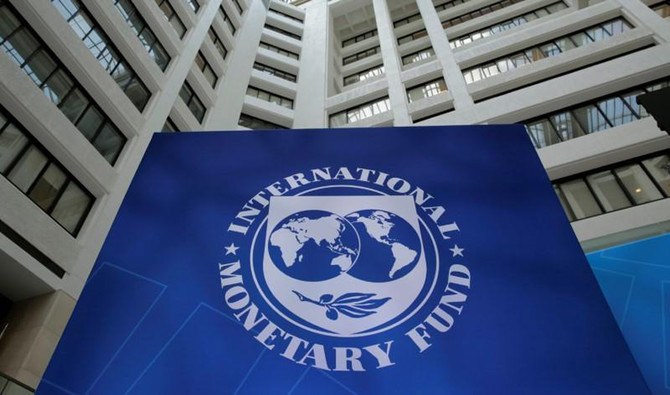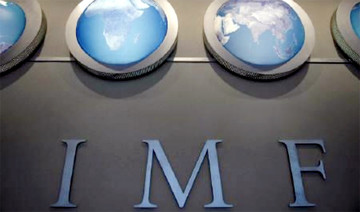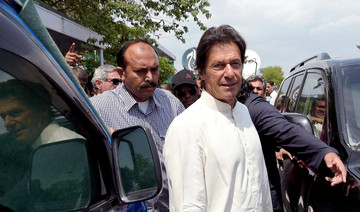ISLAMABAD: From cutting power subsidies to forcing currency devaluations that stoke inflation, the hard choices facing Pakistan as it seeks a bailout from the International Monetary Fund (IMF) pose a major headache for populist new Prime Minister Imran Khan.
Pakistani officials met IMF representatives this week in Bali and formally requested Islamabad’s 13th bailout since the late 1980s to give the economy breathing room, while they implement reforms aiming to end decades of boom and bust cycles.
On top of lending the nuclear armed state billions of dollars to avert another balance of payments crisis, the IMF is this time expected to push Islamabad much harder to enact structural reforms needed to rebalance the economy, and rein in spending that has boosted growth but blown out the government budget.
Talks with the IMF have been launched and managing director Christine Lagarde has already said she would require “absolute transparency” of Pakistan’s debts, including those owed to close ally China.
Any reforms prescribed by the IMF would threaten Khan’s lofty campaign promises, like his vow to create 10 million jobs and establish an “Islamic welfare state” modelled on the ideas first voiced by the Prophet Muhammad in the holy city of Medina.
Khan was elected in July with the support of many poorer Pakistanis desperate for a change in a nation where the illiteracy rate hovers above 40 percent, health care is shoddy, and joblessness or underemployment rife among the country’s 208 million people.
Creating 10 million jobs would require the economy to grow at 8 percent but that can only be achieved with economic shock therapy that in the short term will smother growth to far below the 5.8 percent achieved in the year to June, economists say.
“The path to Medina is full of thorns, not roses,” said one expert at an international donor agency, who declined to be identified as he is not authorized to speak on the issue.
“To get there, they have to go through these painful measures now.”
The IMF predicted this week Pakistan’s growth will slow to 4 percent in 2019 and fall to about 3 percent in the medium term.
A sharp increase in oil prices — Pakistan imports about 80 percent of oil needs — has contributed to a current account deficit that widened 43 percent to $18 billion in the fiscal year that ended June 30. The weakening Pakistan rupee also contributes to a rise in local energy prices.
On Wednesday, Khan blamed the previous government for the economic mess and urged Pakistanis to remain calm.
“I want to tell all of you to stay strong and not to panic. This is a very short period of time which will go away.”
“FEND FOR OURSELVES“
As an opposition leader, Khan vowed to never “beg” for money from the IMF and swept to power on an anti-corruption platform that was coupled with a promise to enact badly needed reforms, including widening the nation’s taxation net and reforming loss-making state-run enterprises.
But local and foreign investors have welcomed the bailout talks, saying Pakistan’s economy needs the IMF’s protective blanket because of rising oil prices and emerging markets turmoil. However, they also warned of tougher conditions compared to 2013, when Islamabad was given repeated wavers and avoided harsh reforms after receiving a $6.7 billion IMF loan.
“Better that we enter into a well-structured IMF program than try to fend for ourselves,” the Pakistan Business Council said in a statement.
In a nod to the IMF, which called the rupee “over-valued,” Pakistan’s central bank on Tuesday carried out its fifth devaluation since December, sending the rupee tumbling 7.5 percent to take its losses to 26 percent in the past 10 months. More devaluations are expected.
The bank has also hiked its main interest rate by 275 basis points since January, to 8.5 percent, and analysts say more rises are on the horizon.
The devaluations have stoked inflation worries and are putting extra pressure on debt servicing, which is a major concern for the new government. Debt service costs are set to account for 35 percent of the budget in the fiscal year to next June, according to forecasts from the previous government. Officials now expect the debt to GDP ratio to rise above 70 percent.
“We really have to get out of this debt dependency trap,” Muhammad Hammad Azhar, Pakistan’s state minister for revenue, told Reuters.
He said the government was considering the possible restructuring of some foreign loans but did not give details.
Khan’s government blames many of Pakistan’s current economic woes on the previous administration’s “strong rupee” policy, which rendered Pakistan’s exports uncompetitive. The central bank also burnt through currency reserves defending the rupee.
Reserves have plummeted 41 percent this year to stand at $8.3 billion, or about 1.6 months of import cover, despite China lending billions of dollars to Islamabad to prop up the currency.
CHINA LOANS
China has made Pakistan a flagship country in its vast Belt and Road infrastructure building program, pledging about $60 billion in financing for ports, railways and roads. But rising debt levels have caused Islamabad to cut the size of the biggest Belt and Road project by about $2 billion.
US Secretary of State Mike Pompeo has said there would be “no rationale” for an IMF bailout of Pakistan that pays off Chinese loans.
Khan’s administration had also approached China and Saudi Arabia, Islamabad’s other historical ally, for help to prop up the economy but they appear to have balked at coming to Pakistan’s rescue on their own.
Though the size of any bailout is not clear, Khan this week suggested Pakistan needs $10-12 billion. On top of the IMF, the World Bank and the Asian Development Bank are expected to lend money, as they did in 2013. China and Saudi Arabia may also contribute.
The IMF last week commended Pakistan for curbing gas and electricity subsidies, raising interest rates and devaluing the currency. But it warned that Islamabad needs to go even further in all those areas.
Pakistani officials say they are braced for tough measures but hope to expand the tax base and raise more revenue rather than rely purely on austerity to patch up a budget deficit which hit 6.6 percent of GDP in the fiscal year to end June. They also want to help further stimulate exports.
Azhar said Khan’s party was elected on a reforms agenda and would push through changes “irrespective of any IMF bailout.”
On Wednesday, Khan launched a program aiming to construct five million homes for the poor, a top campaign promise. But he didn’t explain how the government will pay for it. (Reporting by Drazen Jorgic Editing by Martin Howell and Raju Gopalakrishnan)
‘Path of thorns’: An IMF bailout set to impede Pakistan PM’s populist agenda
‘Path of thorns’: An IMF bailout set to impede Pakistan PM’s populist agenda

- IMF expected to push Pakistan to make some hard choices
- Measures likely to crimp new PM Khan’s social spending plans
Pakistan farmers announce nationwide protest from May 10 amid wheat import crisis

- Farmers are demanding the government stop wheat imports that have flooded markets, leading to price slump
- Agriculture contributes about 24 percent of the GDP and accounts for half of the employed labor force in Pakistan
ISLAMABAD: Pakistani farmers on Sunday announced a nationwide protest over the wheat import crisis from May 10, a day after Prime Minister Shehbaz Sharif promised to address their grievances.
Farmers in Pakistan’s Punjab province, which produces most of the wheat crop, are demanding the government stop wheat imports that have flooded the market at a time when they expect bumper crop.
They say the import of wheat in the second half of 2023 and the first three months of this year has resulted in excess amounts of the commodity in the country, leading to reduced prices.
On Saturday, PM Sharif took notice of the matter and formed a committee under the Ministry of National Food Security and Research to address farmer grievances, Pakistani state media reported.
“On the 10th [of May], after the Friday prayers, we are initiating protest from Multan and this protest will be expanded to the whole of Pakistan,” Khalid Khokhar, who heads the Kissan Ittehad Pakistan, said at a press conference.
“Thousands of farmers will come, there will be hundreds of tractors, trailers. Animals, cattle and children and women will also be accompanied.”
Agriculture is the backbone of Pakistan’s economy and constitutes its largest sector. According to the Pakistan Bureau of Statistics (PBS), agriculture contributes about 24 percent of the Gross Domestic Product (GDP) and accounts for half of the employed labor force in the country.
However, the prices of wheat have dropped in Pakistan in recent weeks and are much below the government’s support price of Rs3,900 per 40-kilogram bag.
“We do not have any option other than this. The mafia made Rs100 billion, Pakistan’s $1 billion worth of foreign exchange was spent and the farmers incurred around Rs400 billion losses,” Khokhar said.
“They slaughtered 60 million farmers just for the sake of corruption.”
Pakistan’s Dr. Shahzad Baig makes it to TIME’s 100 world leaders in health

- Before arriving in Pakistan, Baig was a technical adviser to Nigeria’s polio eradication effort, which remained successful
- Pakistan, Afghanistan are only two countries in world where polio continues to threaten health and well-being of children
ISLAMABAD: US news magazine TIME has included Dr. Shahzad Baig, the Pakistan Polio Eradication Programme’s national coordinator, to its list of 100 most influential people across the world in the field of health in 2024.
The list, titled ‘TIME100 HEALTH,’ this week honored individuals from across the world for their services for fresh discoveries, novel treatments, and global victories over disease.
Baig was recognized for his efforts for the eradication of poliovirus, which mainly affects children under the age of ten years by invading their nervous system, and can cause paralysis or even death.
Pakistan and Afghanistan are the only two countries in the world where polio continues to threaten the health and well-being of children.
“On the front lines in the effort to stamp it [polio] out is Dr. Shahzad Baig, national coordinator of Pakistan’s polio-eradication program,” TIME wrote on its website.
“In 2019, polio disabled or killed 147 people in Pakistan; since Baig assumed the position, in 2021, case counts have plummeted, with only six children stricken in 2023.”
Before arriving in Pakistan, Baig was a technical adviser to Nigeria’s polio eradication effort, which succeeded spectacularly, according to the US magazine.
In 2020, the African country became the most recent one in the world to be declared polio-free.
“If Baig has his way, Pakistan will be the next,” it added.
Canada has ‘political compulsion’ to blame India for Sikh slaying — New Delhi

- Canadian police on Friday arrested three for the murder of Hardeep Singh Nijjar, saying they were investigating their links to Indian government
- The killing soured Ottawa-New Delhi diplomatic ties after PM Trudeau said there were ‘credible allegations’ linking Indian intelligence to crime
NEW DELHI: Canada’s investigation into alleged Indian involvement in the assassination of a Sikh separatist in Vancouver last year is a “political compulsion,” New Delhi’s foreign minister said after three Indian citizens were arrested over the killing.
Canadian police on Friday arrested the trio for the murder of Hardeep Singh Nijjar, saying they were investigating their links to the Indian government, “if any.”
The killing sent diplomatic relations between Ottawa and New Delhi into a tailspin last autumn after Prime Minister Justin Trudeau said there were “credible allegations” linking Indian intelligence to the crime.
India vehemently rejected the allegations as “absurd,” halting the processing of visas for a time and forcing Canada to significantly reduce its diplomatic presence in the country.
“It is their political compulsion in Canada to blame India,” the Press Trust of India news agency quoted external affairs minister S. Jaishankar as saying on Saturday.
Thousands of people were killed in the 1980s during a separatist insurgency aimed at creating a Sikh homeland known as Khalistan, which was put down by security forces.
The movement has largely petered out within India, but in the Sikh diaspora — whose largest community is in Canada, with around 770,000 people — it retains support among a vocal minority.
New Delhi has sought to persuade Ottawa not to grant Sikh separatists visas or political legitimacy, Jaishankar said, since they are “causing problems for them (Canada), for us and also for our relationship.”
He added that Canada does not “share any evidence with us in certain cases, police agencies also do not cooperate with us.”
Nijjar immigrated to Canada in 1997 and acquired citizenship 18 years later. He was wanted by Indian authorities for alleged terrorism and conspiracy to commit murder.
The three arrested Indian nationals, all in their twenties, were charged with first degree murder and conspiracy.
They were accused of being the shooter, driver and lookout in his killing last June.
The Canadian police said they were aware that “others may have played a role” in the murder.
In November, the US Justice Department charged an Indian citizen living in the Czech Republic with plotting a similar assassination attempt on another Sikh separatist leader on American soil.
A Washington Post investigation reported last week that Indian foreign intelligence officials were involved in the plot, a claim rejected by New Delhi.
PCB chief announces $100,000 reward for each player if Pakistan wins T20 World Cup

- Mohsin Naqvi made the announcement during his visit to Qaddafi Stadium, where the Babar Azam-led side has been practicing
- The Pakistan side is scheduled to travel to Ireland, England for T20 tours later this month, followed by the World Cup in June
ISLAMABAD: Mohsin Naqvi, chief of the Pakistan Cricket Board (PCB), has announced $100,000 reward for each player in case the national side wins the upcoming Twenty20 World Cup, the PCB said on Sunday.
Naqvi made the announcement during his visit to the Qaddafi Stadium in Lahore, where the Babar Azam-led side began the national camp on Saturday, according to the PCB.
He stayed there for two hours and held a detailed discussion with Pakistan players on the strategy of upcoming games.
“This reward is nothing compared to Pakistan’s victory,” Naqvi was quoted as saying.
“I hope you will raise the green flag. Play without any pressure and compete hard. God willing, victory will be yours.”
The Pakistan side is scheduled to travel to Ireland and England for T20 tours later this month.
The tours will help the side prepare for the T20 World Cup scheduled to be held in the United States and the West Indies in June.
IMF says its mission will visit Pakistan this month to discuss new loan

- Pakistan last month completed a short-term $3 billion program, which helped stave off sovereign default
- But the government of Prime Minister Shehbaz Sharif has stressed the need for a fresh, longer-term program
KARACHI: An International Monetary Fund mission is expected to visit Pakistan this month to discuss a new program, the lender said on Sunday ahead of Islamabad beginning its annual budget-making process for the next financial year.
Pakistan last month completed a short-term $3 billion program, which helped stave off sovereign default, but the government of Prime Minister Shehbaz Sharif has stressed the need for a fresh, longer-term program.
“A mission is expected to visit Pakistan in May to discuss the FY25 budget, policies, and reforms under a potential new program for the welfare of all Pakistanis,” the IMF said in an emailed response to Reuters.
Pakistan’s financial year runs from July to June and its budget for fiscal year 2025, the first by Sharif’s new government, has to be presented before June 30.
The IMF did not specify the dates of the visit, nor the size or duration of the program.
“Accelerating reforms now is more important than the size of the program, which will be guided by the package of reform and balance of payments needs,” the IMF statement said.
Pakistan narrowly averted default last summer, and its $350 billion economy has stabilized after the completion of the last IMF program, with inflation coming down to around 17 percent in April from a record high 38 percent last May.
It is still dealing with a high fiscal shortfall and while it has controlled its external account deficit through import control mechanisms, it has come at the expense of stagnating growth, which is expected to be around 2 percent this year compared to negative growth last year.
Earlier, in an interview with Reuters, Finance Minister Muhammad Aurangzeb said the country hoped to agree the contours of a new IMF loan in May.
Pakistan is expected to seek at least $6 billion and request additional financing from the Fund under the Resilience and Sustainability Trust.










